If you're in B2B SaaS sales or marketing, you've likely noticed the rise of interactive product demos over the past few years. This trend is reshaping how companies showcase their products, moving beyond the traditional “book a demo” approach.
The core idea:
- Replace “book a demo” with “take a tour” or a similar CTA
- Give potential users a hands-on experience, even if they don’t sign up
- Improve lead quality by filtering out casual browsers
For sales-led products where self-signup isn’t an option, interactive demos can be especially powerful, offering a compelling way to engage prospects.
If you’re looking to showcase your product more effectively, accelerate your sales cycle, and boost conversions, here are the 11 best product demo software tools for 2025 to help you get there. ☝.
Here are the 11 best tools to create an ungated interactive product demo
Let's take a look at the differences.
1. Navattic
Best suited for: Embedding an interactive demo on a website, or for sharing with prospects. Mobile optimized demos.
Free trial: No, request a demo here.
Starting price: Start up plan is $300/month for companies with less than 20 employees. $500/month for companies up to 100 employees. Prices are on annual billing cycle, monthly plans are also available. See pricing.
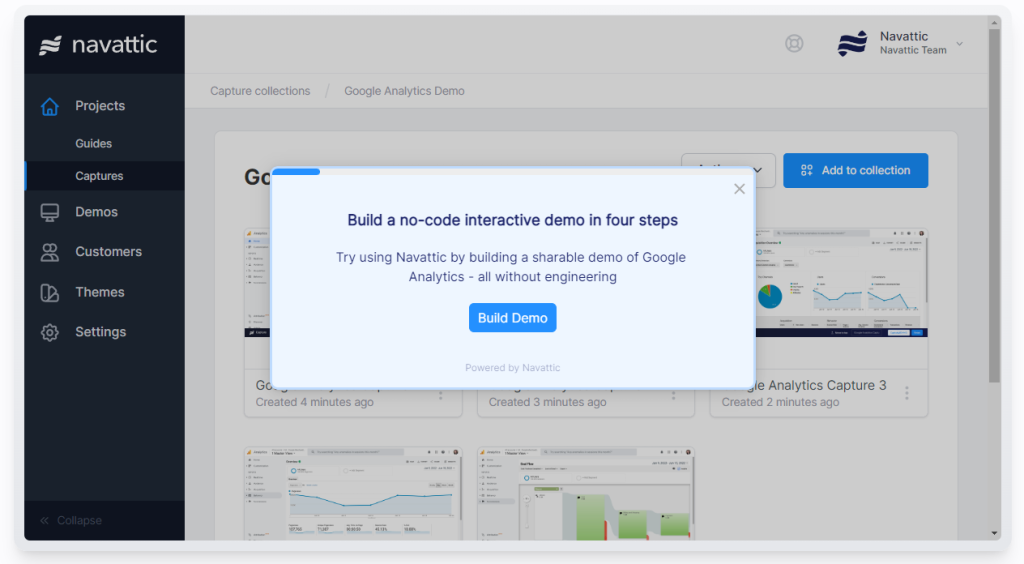
Key features
Navattic lets you build an interactive product demo without engineering resources. It can be embedded onto a website, or used for any other purpose (e.g. to send directly to prospects async without needing a call,)
It lets you create guided product tours, or a ‘choose your own adventure' style of demo with checklists & options for users to explore.
You can play around with their live interactive demo to get a feel for how it works.
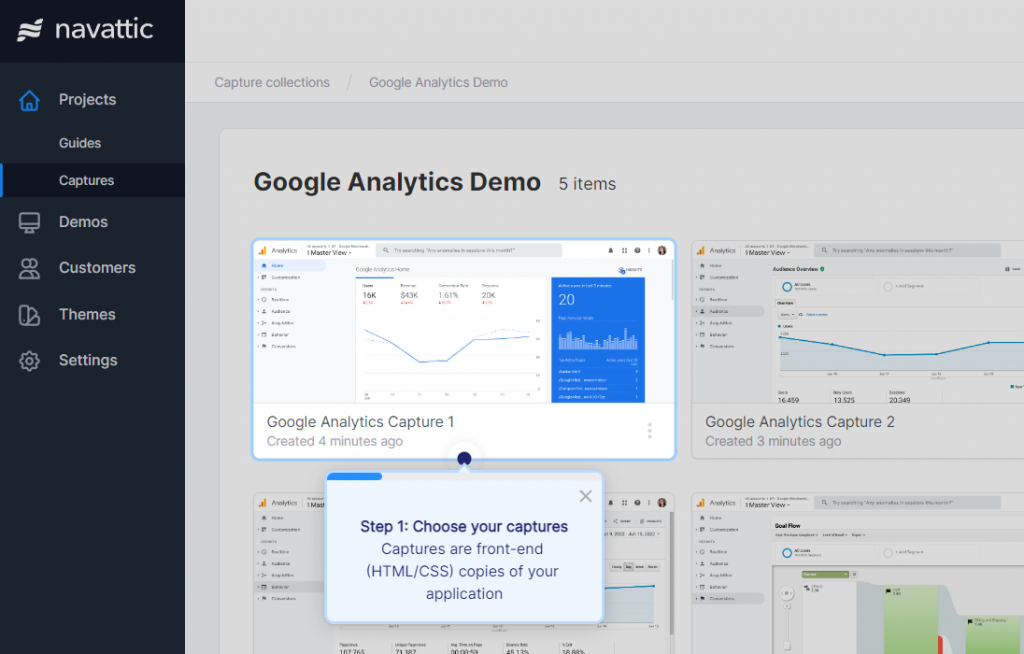
There are integrations with Hubspot, Salesforce, Marketo, Segment, and Google Analytics — making it easier to see how demo interactions impact metrics further down the funnel.
It's intuitive to use & fast to get a demo set up, even for non-technical people. Our marketing team at Modash (my full-time gig) recently started to use it.
Lastly, they have an SOC 2 type 2 certification — which checks the boxes for mid-market & enterprise security requirements.
Pricing
Navattic's pricing has different tiers; $300/month for less than 20 employees (special start up plan!) $500 for ‘Base' (company size up to 100 employees & base features.) $1,000/month for larger companies, plus extras like SSO & dedicated success managers/coaching. View pricing page. Monthly plans are available, but you save 20% with annual.
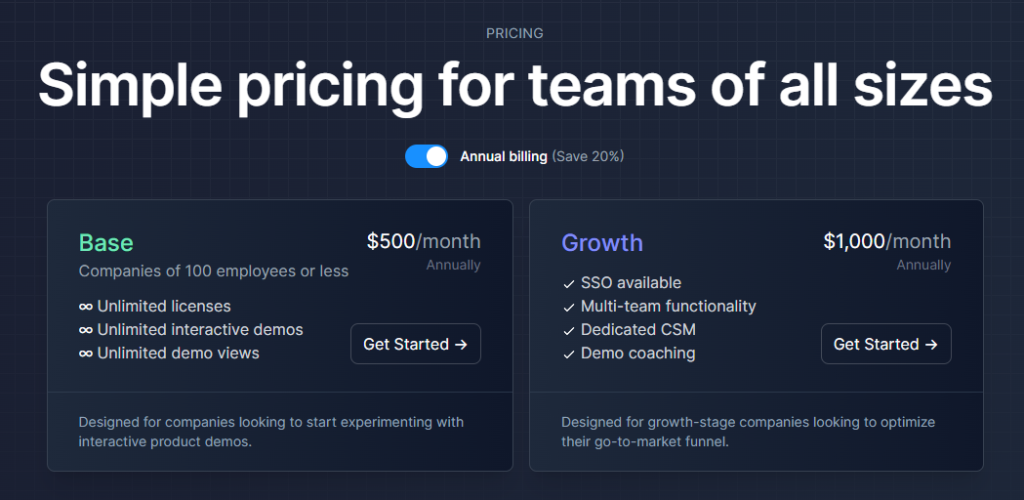
2. HowdyGo
Best suited for: Marketers trying out embedded interactive demos on their website for the first time, with a full-featured tool.
Free trial: Yes, sign up here
Starting price: Basic plan is available from $79/month (annually) for unlimited demos & users. $319/month plan for advanced functionalities such as demo analytics and CRM integrations. See pricing
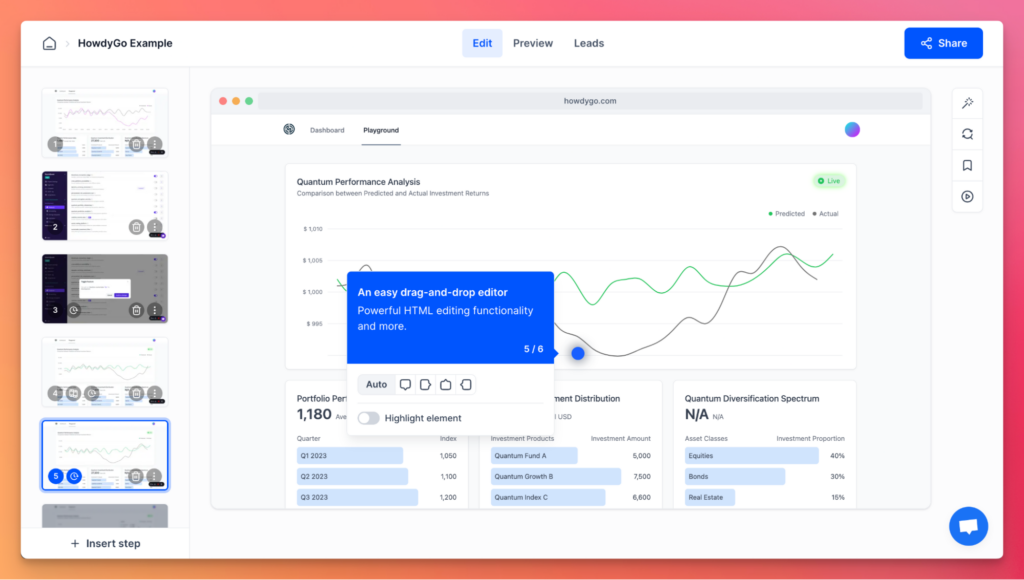
Key features
HowdyGo is for marketers who want to get started with interactive demos and grow their use as they see it performing. It’s quick to start with single-click recordings, and an editing experience that will feel familiar to people who have used Google Slides or Powerpoint.
Reviews on G2 noted the availability of a hands-on team who were happy to help you craft your demos.

HowdyGo integrates with Hubspot, Salesforce, Marketo, Segment, and Google Analytics, so you can track the impact of your demos on marketing and sales metrics, and send leads to your CRM. This functionality is exclusively available on the second-tier Analyze plan.
They note on their website that they’re happy to build integrations with other products, so if yours isn’t listed on their integration page, it’s worth getting in touch with them.
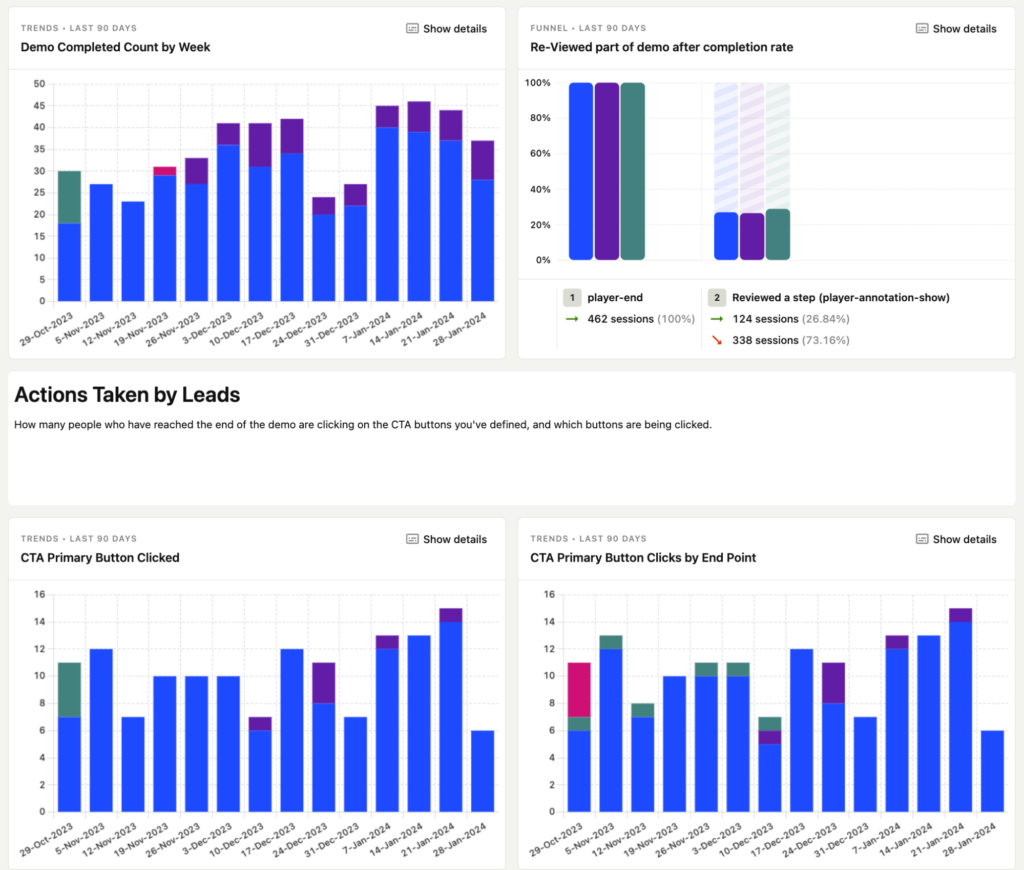
They provide easy-to-understand demo metrics (available on the second tier) to help you improve your conversion rate over time.
Pricing
HowdyGo’s pricing is publicly available.
– It starts at $79/month annually or $99/month on a rolling basis.
– The second tier includes hands-on support, analytics and access to all integrations. It begins at $319/month.
– They also offer an enterprise-friendly tier if you need SSO or custom domains and begins at $799/month.
3. Walnut
Best suited for: a unified demo creation platform for marketing & sales teams.
Free trial: No. Request a demo here.
Starting price: Unknown.

Key features
Walnut is one of the most well-known product demo tools on the market. It excels in serving sales/pre-sales teams to deliver personalized demos quickly, and it can also be used to create great embedded demos for marketing.
If Navattic or HowdyGo didn't suit your needs because of a lack of sales focus, Walnut might be a better fit.
The capture tool works very similarly — it lets you capture your front-end. You can create templates, and quickly produce multiple tailored demos for specific use cases/pages. Editing can be done entirely no-code, but it allows advanced demo editing with HTML coding too.
Their ‘Beyond Demos‘ feature set includes analytics & performance insights, which provides an easy way to analyze & test different demos.

It also serves teams very well, with team collaboration features, demo libraries & templates, permissions control, and security.
It has integrations with Salesforce & Hubspot, but lacks a couple of others (e.g. Google Analytics, Zapier, Segment), which is one reason you might look for a Walnut alternative.
Pricing
Walnut determines its pricing based on user seats. Every plan comes with unlimited demos created and unlimited demo views.
4. Reprise
Best suited for: teams of 300+ with significant requirements in both sales & marketing use cases with enterprise security
Free trial: No. Request a demo.
Starting price: unknown.
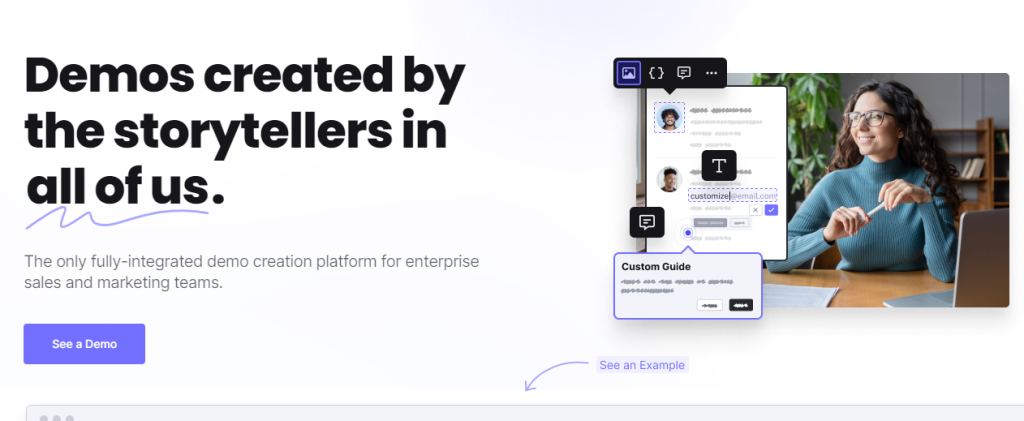
Key features
Reprise offers a versatile interactive demo software creation platform that you to build three types of demos: product walkthroughs (like Navattic above), plus live demo overlays for sales, and complete explorable sandbox environments to give to prospects.
This versatility makes Reprise particularly useful for organizations that need a unified platform for their sales and marketing teams, and have the budget for a more expensive platform.
They're built for enterprise, and focus on team sizes of 300+.
Reprise also has enterprise-grade security, including being one of the earliest platforms in this space to get SOC 2 type 2 certified, and having a dedicated in-house Direct of Information Security.
You can see an example of an interactive demo made with Reprise here.
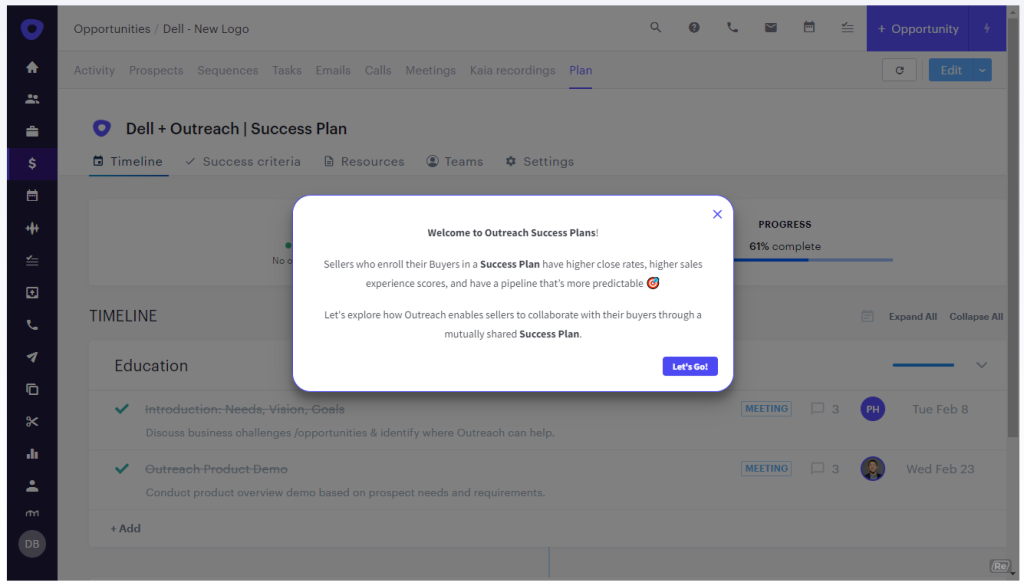
The platform also includes native integrations with analytics tools such as Google Analytics, Salesforce CRM, or Hubspot Analytics.
Typically, Reprise customers would report a longer time-to-value to get set up initially compared to similar platforms. Once everything is in place, though, it gets much faster to replicate your demo templates (e.g. an AE can prepare for a sales call quickly).
Pricing
Reprise pricing isn't publicly available; get a tailored quote by requesting a demo. Unlike Walnut & Navattic, Reprise does not include unlimited seats & demos in plans.
5. Storylane
Best suited for: A scalable tool that handles both screenshot & HTML capture for marketing & sales.
Free trial: offers a freemium model. Request a demo here.
Starting price: Free. Paid plans from $40 per seat per month.

Key features
Storylane is the first tool on our list to support both HTML & screenshot capture. It has a scalable pricing model — starting at $40/month (for screenshot + video capture), or $500/month (to include HTML capture).
It also has a self-serve option; you can sign up and try building 1 demo for free.
Here's some interesting features worth knowing about:
- Use AI to generate product tour text, voiceovers, and even translations
- Include various types of lead capture forms, and Intercom live chats within demos
- Option to integrate video clips within the demos
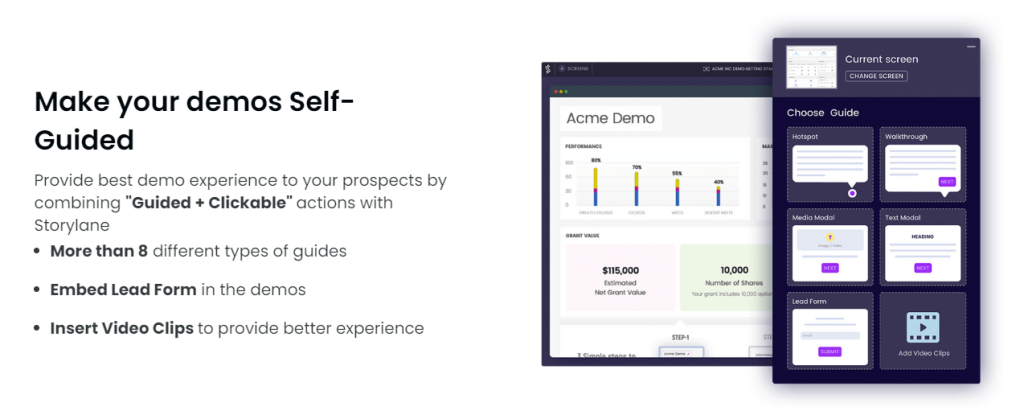
Storylane is pretty comprehsensive with integrations, having HubSpot, Salesforce, Pardot, Zapier, Segment, and Intercom. It also has a unique Clearbit integration. If you're using Clearbit, you'll be able to get data on who's engaging with your demos (even if they don't fill in the lead form).
It also checks the security boxes with SOC2, SSO, and white labeling.
See also: Storylane alternatives.
Pricing
Storylane's pricing is based on features & seats. It has a scalable pricing model — starting at $40/month per user seat (for screenshot + video capture), or $500/month to include HTML capture (includes 5 user seats, +$100/seat).
The $500+ plan adds extra features like custom lead forms and more integrations.
6. Saleo
Best suited for: sales teams to create personalized demos using your live demo environment
Free trial: No. Request a demo here.
Starting price: Unknown.
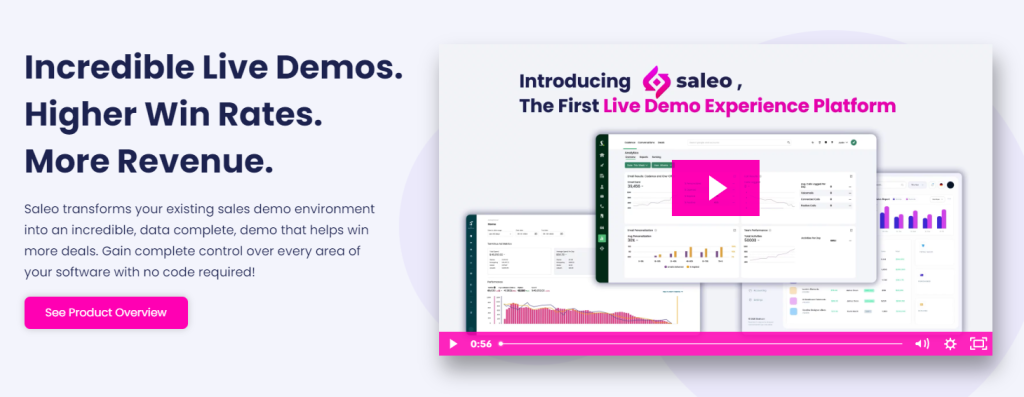
Key features
Instead of taking an “interactive screenshot” of your original product environment, it utilizes your existing live environment and lets you directly edit & overlay it.
It's more similar to Reprise's ‘Reveal' product, than to Navattic or Tourial.
It's built for sales teams doing live calls, and eliminates the common problem of demos encountering bugs & issues when using the live platform. Additionally, it lets sales people really *show* their prospects exactly how the UI would look/feel with their own data, rather than asking them to imagine that X & Y were different.
Saleo's other big selling point is its easy-to-grasp but powerful interface, which provides enough features and options to fill the needs of smaller teams as well as larger organizations.
Pricing
Saleo's pricing isn't publicly available. Contact the team for a demo.
7. Demoboost
Best suited for: a single platform to cover marketing, sales, and success demo use cases
Free trial: No. Request a demo here.
Starting price: Unknown.
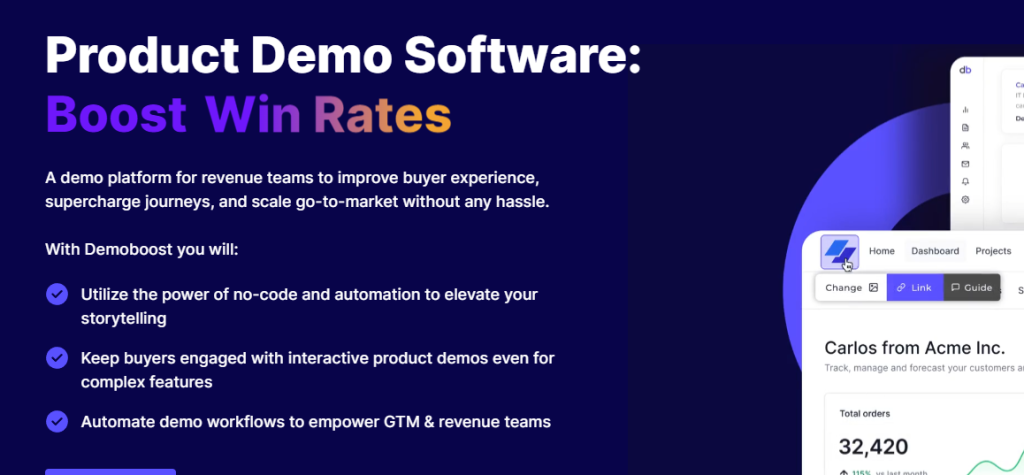
Key features
Demoboost works for marketing product walkthroughs, as well as live calls for sales teams.
Fundamentally, the way Demoboost works is quite similar to the tools above, but prioritizes supporting sales teams rather than marketing. It uses HTML & CSS, rather than screenshots, for captures.
Here's some notable features:
- Internal feedback: add comments Google Docs style to collab on demo creation
- Multi-media: incorporate images/videos alongside your product UI during product tours
- Speaker notes: AEs can add notes that wouldn't be visible to prosects during calls
- Built-in A/B testing for CTAs & messaging
Regarding security features, Demoboost is GDPR compliant, ISO certified, and has SSO & role-based access.
Demoboost's customer success team are offering unlimited support in helping to build demos, even before you sign up as a customer. If you're looking to create a demo library for a sales team, it's worth speaking to their team.
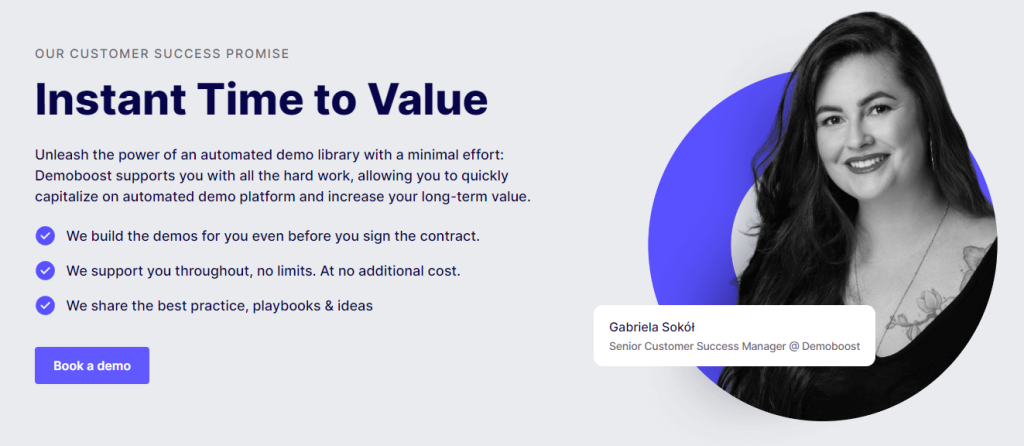
Pricing
Demoboost pricing isn't publicly available. Contact their team.
8. Arcade
Best suited for: marketing teams in need of marketing demos that can easily be embedded onto websites, blogs, and social media.
Free trial: offers a freemium model. Sign up here.
Starting price: Free. Paid plans from $38 per month.
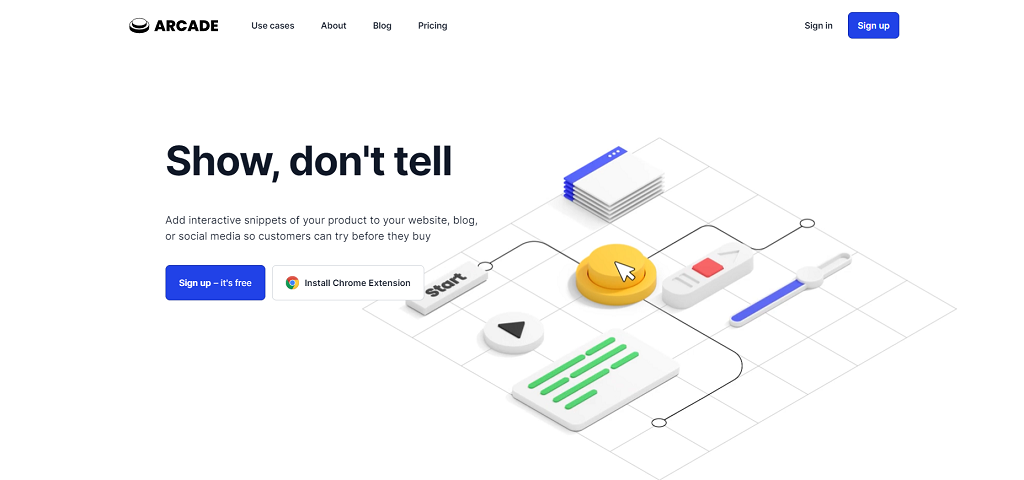
Key features
Arcade is a PLG platform geared towards marketing and sales teams. Its strong suit is the ability to create light, HTML5-friendly demos that can be easily embedded onto virtually any modern website or social media platform.
Arcade is notable for its accessibility, user-friendliness, and light weight, with most of the platform's functionality available through a simple Chrome extension. Despite being among the lightest of popular demo software solutions, it doesn't sacrifice any extra functionalities, with a built-in analytics tool and vital integrations. However, its use is largely limited only to the creation of embeddable marketing showcases.
Pricing
Arcade uses a freemium model, with the free version letting you create up to three publicly shared demos. The $38/month Pro package removes the demo limit, watermarks, and adds premium features such as analytics or CTA's. Custom plans are also available for larger organizations, with a negotiable price.
9. Demostack
Best suited for: a comprehensive demo creation platform for presales, sales, & marketing
Free trial: No. Sign up here.
Starting price: Unknown.

Key features
Demostack is a comprehensive platform with a big focus on sales/presales. It's primary use case is to clone your product into a bulletproof personalized demo environment for live sales calls & sandboxes, though it can serve website embeds for marketing/success too.
One unique feature is their Demo HQ, which aims to operationalize all things demos. Like the name suggests, it provides one place for everything demo-related: customizing templates, managing sandbox environments, measurement & analytics, sharing/embedding, etc.

Demostack are hot on security, being SOC 2 certified, and compliant with all acronyms: GDPR, CCPA, HIPPA. They also do regular pen tests & have transparent system status updates. Learn more in the Trust Center.
While they have relatively few intgrations overall, Demostack do have a Salesforce integration which lets you understand better how demos are affecting metrics further down the funnel
Pricing
Demostack's pricing is based on a platform fee plus seats, and product differentiation (tours, live demos, sandbox environments). Every plan comes with unlimited tours.
10. Tourial
Best suited for: creating interactive demos for marketing use cases with screenshots/videos
Free trial: No, request a demo here.
Starting price: $790/month (paid annually). See pricing.
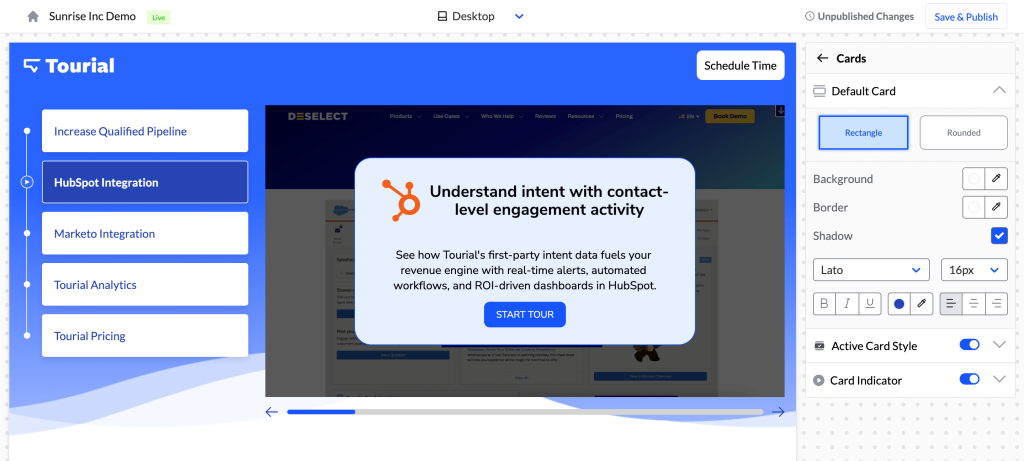
Key features
Similar to Navattic, Tourial lets you create interactive product demos & embed on a website, or share via a URL.
It works using a Chrome extension to capture screenshots & videos, rather than capturing HTML / CSS. That method might be more suitable for tools with:
- Lots of complex workflows → you can add video captures to save on click fatigue
- Mobile apps & mobile traffic (it's much easier to mobile optimize)
- Lots of JavaScript functionality → HTML capture will miss actions e.g. drag n drop
Tourial has integrations with HubSpot, Marketo, & Pardot which allow you to convert visitors directly within the demo and track all high intent activity without having to gate it with a lead form first. Additionally, you can use a Slack integration to send alerts to your team.
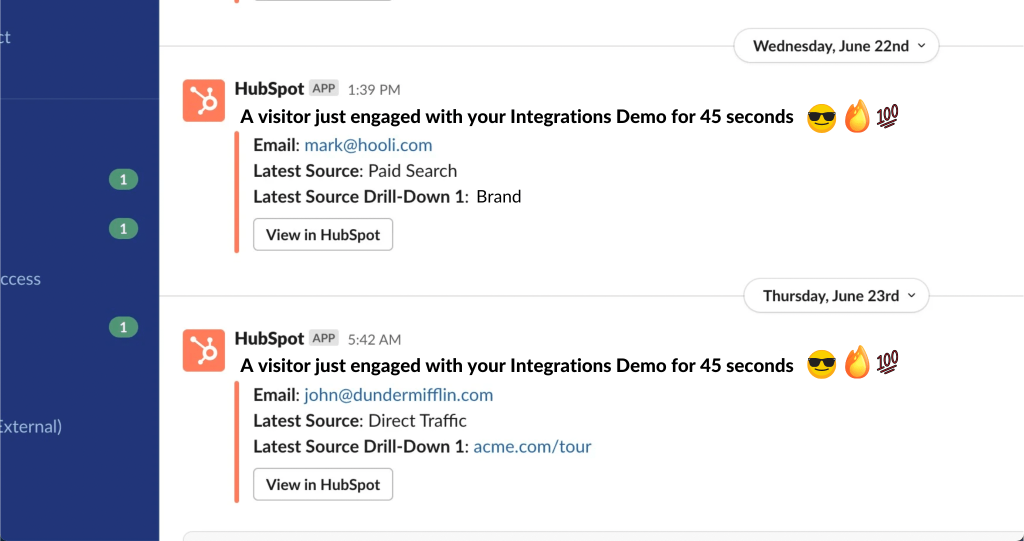
You can also integrate with your scheduling platform (Chili Piper, Calendly, HubSpot) to offer call bookings directly within your demo, create custom tracking links, add demos to your G2 or Trustradius listing, and demo engagement analytics.
Lastly, Tourial has a feature called Live Workflow Capture which really speeds up creating demos. You click a button, go through the workflow, and it automatically captures every click as a screenshot & things like typing & scrolling are captured as video.
Take a look at their own demo center for more on how it works (Live Workflow Capture is shown under Product –> Chrome Extension).

Here's a more detailed comparison of Navattic vs Tourial, if you're interested.
Pricing
Tourial offers 1 simple base platform package that comes with unlimited demos, user seats, demo views, integrations, forms, support, and TourPlayers. View full plans page here.
Their Startup package is available for companies with < 50 employees and includes all features, onboarding, and digital support.
11. Consensus
Best suited for: mid-market & enterprise looking to use interactive demos for pre-sales / sales
Free trial: No. Get a quote here.
Starting price: $12k annually.

Key features
Consensus is a mature solution that prioritizes pre-sales & sales use cases, but can cater for marketing too.
It lets you build demos with a series of videos, interactive tours, forms & other resources. You can create a reusable template library to save time. Take a look at their own interactive demos here.
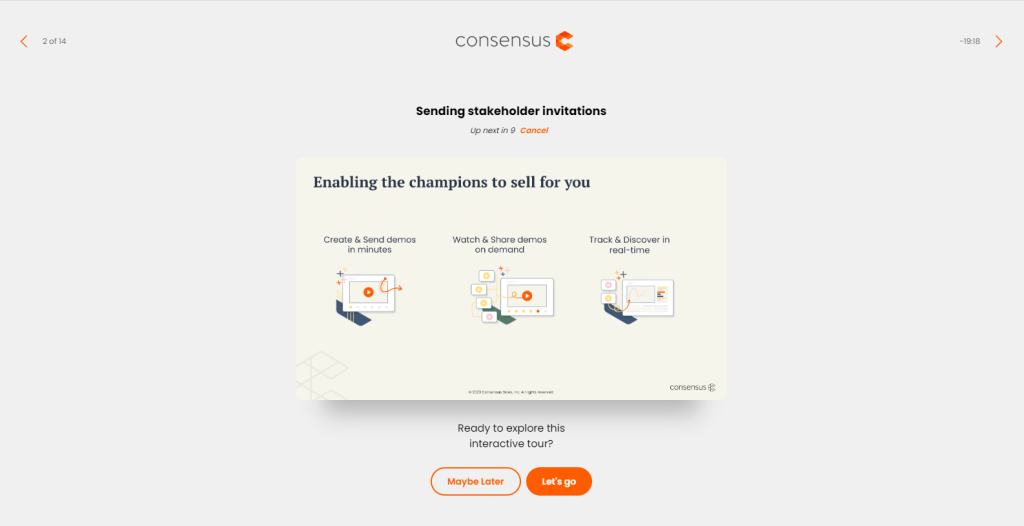
A unique feature worth mentioning is personalization & branching logic for product tours:
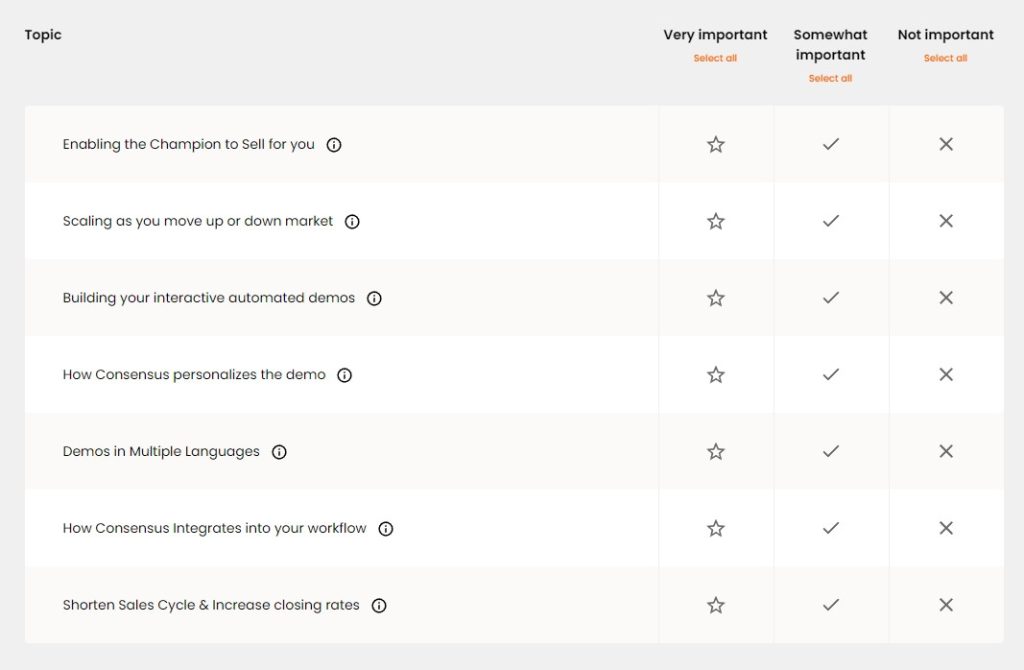
That lets you take a generic template and make sure prospects get shown the things that are most important to them. Additionally, you gather a ton of extra data from prospects, and AEs can get great data ready to prepare for sales calls.
A second unique feature is the ‘BuyerBoard'; this gives your Champion a dashboard to learn how/when their colleagues engage with the demo they share with their team.
Consensus have several useful integrations including Salesforce/Pardot, Outreach (embed demos in email templates), and Zapier/API for custom stuff.
Pricing
Consensus pricing starts from $12k annually, but specific pricing isn't available publicly. Pricing increases with user seats.
Watch the video
Prefer video format? Here's my 10-minute overview of 5 of these tools 🙂
A SaaS PLG Trend: Interactive Product Demo Software
FAQ
What is an ungated interactive product demo?
An ungated interactive demonstration is open for anyone to explore immediately. Unlike its gated counterparts, where users are asked to hand over details like their name, email, or phone before proceeding. For ungated product demos, there's no upfront form to fill out or registration required, making for a positive user experience.
Can interactive product demos be integrated with other marketing tools and platforms?
Yes, interactive demos can often seamlessly integrate with various marketing tools and platforms, enhancing lead capture, personalization, and analysis. They can generally be linked to most popular CRM systems for lead management, email marketing platforms for automated follow-ups, analytics tools for detailed performance insights, and social media for increased reach.

I recently read a Forrester’s report on Reprise, which showed a 60% uplift in average website interactions that converted to leads, and a much higher percentage of these leads entering the sales pipeline.. so worth testing implementing an interactive demo.